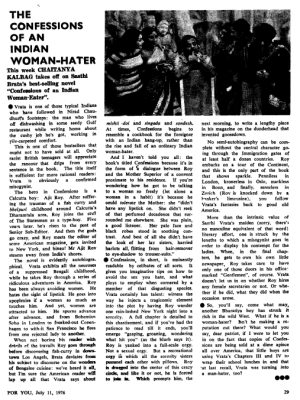THE CONFESSIONS OF AN INDIAN WOMAN-HATER
Published date: 11th Jul 1976, For You
Vrata is one of those typical Indians who have followed in Nirad Chaudhurt’s footsteps: the man who lives off dishwashing in some seedy Gulf restaurant while writing home about the cushy job he’s got, working in rile-carpeted comfort.
This is one of those bestsellers that ought not to have sold at all. Only racist British teenagers will appreciate the rancour that drips from every sentence in the book. The title itself is sufficient for more rational readers: Vrata is obviously a confirmed misogynist.
The hero in Confessions is Calcutta boy: Ajit Roy. After suffering the traumas of a fish curry and bhelpuri childhood around Calcutta’s Dharamtala area, Roy joins the staff of The Statesman as a type boy. Five vears later. he’s risen to the post of Senior Sub-Editor. And then the gods go crazy, and Roy meets the editor of some American magazine, gets invited to New York, and bingo! Mr Ajit Roy steams away from India’s shores.
The novel is evidently autobiographical. Vrata exhibits all the neuroses of a suppressed Bengali childhood. while he takes Roy through a series of ridiculous adventures in America, Roy has been always avoiding women. He hates the sight of lipstick. He goes into apoplexies if a woman so much as touches him. And yet, women are attracted to him. He spurns advance after advance, and from Bohemian Soho in London to freaked-out Copenhagen to with-it San Francisco he flees from one rejected lady to another.
When not boring his reader with details of the travails Roy goes through before discovering fish-curry in down- town Los Angels, Brata deviates from his subject to discourse on the wonders of Bengalee cuisine: we’ve heard it all. but I’m sure the American reader will lap up all that Vrata says about Mishti Doi and singada and sondesh. At times, Confessions begins to resemble a cookbook for the foreigner with an Indian hang-up, rather than the rise and fall of an ordinary Indian woman-hater.
And I haven’t told you all: the book’s titled Confessions because it’s in the form of a dialogue between Roy and the Mother Superior of a convent proximate to his residence. If you’re wondering how he got to be talking to a woman so freely (let alone a woman in a habit) it’s because he could tolerate the Mother: she “didn’t have any lipstick on. She didn’t reek of that perfumed decadence that sur- rounded me elsewhere. She was plain, a good listener. Her pale face and black robes stood in soothing contrast. And best of all she didn’t have the look of her lay sisters, harried harlots all, flitting from hair-remover to eye-shadow to trouser-suits.”
Confessions, in short, is eminently readable by celibates of all sorts. It gives you imaginative tips on how to avoid the sex you hate, and what ploys to employ when cornered by a member of that disgusting species. Vrata certainly has talent: witness the way he injects a tragicomic element into the plot by having Roy wander one rain-lashed New York night into a sorority. A full chapter is detailed to this chastisement, and if you’ve had the patience to read till it ends, you’ll emerge “gasping, groaning, wondering what hit you” (as the blurb says it). Roy is yanked into a full-scale orgy. Not a sexual orgy. But a recreational orgy in which all the sorority sisters pummel each other with pillows. Roy is dragged into the center of this crazy circle, and like it or not, he is forced to join in. Which prompts him, the next morning, to write a lengthy piece in his magazine on the dunderhead that invented goosedown.
No semi-autobiography can be complete without the central character going through the Immigration gates of at least half a dozen countries. Roy embarks on a tour of the Continent, and this is the only part of the book that shows sparkle. Penniless in London, Kronerless in Oslo, markless in Bonn, and finally, senseless in Zurich (Rov is knocked down by a banker’s limousine), you follow Vrata’s fantasies back to good old America.
More than the intrinsic value of Santhi Vrata’s maiden (sorry, there’s no masculine equivalent of that word) literary effort, one is struck by the lengths to which a misogynist goes in order to display his contempt for the ladies. When, in the final chapters, he gets to own his own little newspaper, Roy takes care to have only one of those doors in his office: marked “Gentlemen”, of course. Vrata doesn’t let us in on whether Roy hires any female secretaries or not. Or whether if he did, what they did when the occasion arose.
So, you’ll say, come what may, another Bharatiya boy has struck it rich in the wild West. What if he is a woman-hater? Isn’t he making a reputation out there? What would you say, dear patriot, if I were to let you in on the fact that copies of Confessions are being sold at a dime apiece all over America, that little boys are using Vrata’s Chapters III and IV to wrap their school lunches in and that at last recall, Vrata was turning into a man-hater, too?






